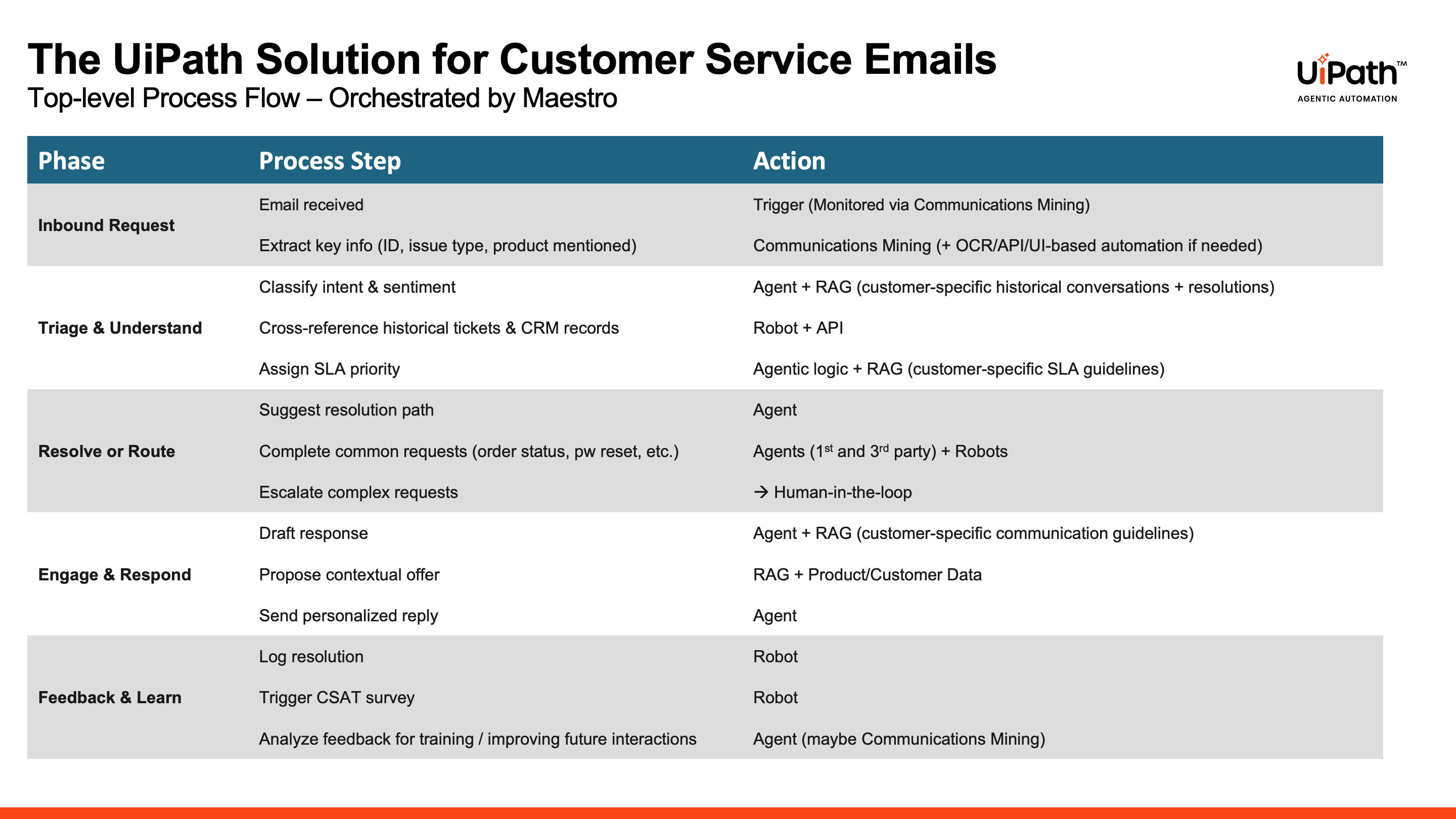Agentic, not fragmented: how AI agents unify the contact center
Summarise:

Companies have invested heavily in new contact center technologies to reduce cost to serve and improve customer experience. However, despite significant investments in generative and conversational AI, contact centers continue to struggle with fragmented processes and manual back-office tasks.
These investments have failed to address the root of the problem: disconnected systems requiring high-touch workflows that slow resolution time. The result? Inflated service costs and degraded customer satisfaction (CSAT).
Fortunately, new AI-enabled approaches to customer service are turning the tide. Indeed, Gartner predicts that agentic AI will autonomously resolve 80% of common customer service issues by 2029, boosting service efficiency and satisfaction.
In this blog, I’ll explain how contact center leaders can use agentic AI to tackle fragmented processes and streamline work across teams and technologies.
Explore further: in addition to this blog post, we've got everything from e-books to demos showcasing how agentic automation helps improve customer service.
Email: the channel contact centers love to hate
While customer support is fragmented across numerous channels, from interactive voice response (IVR) to chat, email remains the channel of choice for customers. Over half (55%) of consumers prefer to communicate via email. However, email has always been a challenge for the contact center, and servicing its demand has proven unscalable. Increasingly unsustainable staffing levels have produced little success, with the average email response time for enterprises now standing at 12 hours.
Early adopters have attempted to address this challenge with AI, but their efforts have been stymied by a lack of integration. The email management process is fragmented across numerous tools and touchpoints, impacting resolution times and CSAT. Email management is dependent on manual tasks that bog down service reps in repetitive work: triaging tickets, looking for data, and crafting manual replies. Every manual step in the email management process increases the risk of errors and delays, undermining customer relationships.
Customer email resolution presents challenges of scale, fragmentation, and a heavy reliance on inefficient manual work. However, thanks to recent advances in AI, email is now ripe for end-to-end automation.
Agentic automation: enhance service efficiency and satisfaction

New to agentic automation? This quick video is a great place to start.
AI agents have become a crucial component in the contact center alongside conversational and generative AI technologies. These are goal-driven entities capable of planning, adapting, and executing on behalf of users. Within the contact center, they are orchestrated alongside automation robots and people to perform work—navigating systems, making decisions, and executing tasks in real time.
AI agents excel at resolving first and second-tier email inquiries, whether it’s routine account updates or policy-dependent refund requests. They can also automate the opening steps of more complex issues—saving time for both customers and service reps.
Yet, proper integration and coordination are critical. Today, many contact centers are investing in AI and automation capabilities—but they often exist in silos: robots handle routine clicks, AI tools parse documents, and people fill in the gaps. An orchestration layer is needed to ensure these capabilities, including AI agents, are properly integrated.
An agentic orchestration solution continuously coordinates tasks across channels and systems so that AI agents work in tandem with robots, tools, and customer service representatives. Whether it’s resolving a billing issue, updating a CRM, or generating a follow-up email, agentic orchestration ensures the right work happens at the right moment.
Driving agentic email automation
Agentic automation enables enterprises to optimize contact center operations, including the elimination of repetitive email work. Indeed, AI agents—leveraging tools and working alongside robots and customer service representatives—can overhaul the entire email support process.
UiPath provides an agentic solution to automate customer email resolution end to end. Through the combined use of multiple tools, including UiPath IXP (Intelligent Xtraction & Processing), emails are automatically classified, routed, or responded to by a combination of AI agents and robots using dynamic templates and data sources. All of these interactions are seamlessly coordinated by UiPath Maestro™, our agentic orchestration capability.

In the UiPath solution, customer service reps still intervene where there's greater uncertainty in the process and to handle exceptions. Yet, the bulk of email processing is performed upstream by AI agents and robots—accelerating responses and improving accuracy. As a result, routine inquiries are automatically processed and resolved, freeing teams to focus on more complex customer needs, increasing organizational productivity, and job satisfaction.
To understand the impact of agentic automation and orchestration, let’s consider a real-world example. The contact center of a leading manufacturer was struggling to process 500,000 emails annually from customers querying their invoices. The team was hitting a glass ceiling with existing automations due to low accuracy in request classification (55%-65%). In addition, between 20-25% of invoices didn't have the proper data extracted, requiring human review.
This changed when the team created an invoice processing agent in under two days using Agent Builder in UiPath Studio. The agent doubled the accuracy in sample data and improved the accuracy of extracted invoices by 10% in a single region pilot. A Microsoft Copilot Studio agent demonstrated early improvements in categorization, while also being evaluated for dispute resolution. The integrated process enabled end-to-end touchless processing, contributing to 18,000 hours saved annually and a 500% incremental ROI on an already automated process.
The benefits of agentic email management
Intelligent email management, enabled by agentic automation and orchestration, improves operational and customer outcomes in four key areas:
1. Increase efficiency
Optimize email workflows: streamline email workflows by automating tasks such as retrieving data, updating records, and scheduling follow-ups
Automate issue resolution: automatically create support tickets from customer emails and track their progress, ensuring no inquiries are missed
Optimize resource allocation: route emails to the appropriate departments based on issue type and priority
2. Enhance customer experience
Personalization: access real-time suggestions and information from knowledge bases and CRM systems to create personalized cross-sell and up-sell promotions
Dynamic experiences: rather than relying on static scripts or limited data snapshots, AI agents dynamically adjust their suggestions based on evolving customer needs and behavior
3. Accelerate categorization and prioritization
Categorization: analyze incoming emails and categorize them based on topic, urgency, and complexity, allowing customer service reps to focus on the most critical issues
Prioritization: rapidly process high-value opportunities or urgent issues like sales leads and customer complaints for rapid resolution
4. Drive customer service improvement
Demand reduction: with process intelligence and communications mining, you can identify and address the root causes of customer contact, helping to reduce demand on overstretched teams and communications channels
Content creation: identify recurring queries and create automated templates for common requests, saving time and effort
Building the agentic contact center
Many contact centers have already deployed AI and automation, but as disparate point solutions—isolated capabilities solving isolated problems.
Agentic automation and orchestration unify these efforts. They create autonomous, observable, end-to-end processes that operate across systems, teams, and tools. This enables contact centers to automate complex service tasks (like email resolution) with consistency, visibility, and adaptability, without the need to replace core systems.
For contact center leaders, the benefits are immediate and strategic: faster case resolution, fewer escalations, and more empowered service reps. AI agents can triage, route, and resolve a high volume of queries autonomously, while orchestration ensures seamless handoffs between systems and people. All of which results in enhanced service quality and operational efficiency alike.
As customer expectations rise and service complexity grows, organizations that embrace AI agents and orchestration will deliver faster, more proactive and scalable support—turning the contact center into a strategic differentiator.
Dive deeper into how UiPath agentic automation supercharges your contact center, reduces demand, and augments service rep productivity.

Growth Sales, Contact Center Expert, UiPath
Bottom of Post Subscription header
SubscribeLanding Modal Headline - Test: 12/09/2024
Success Message!!



